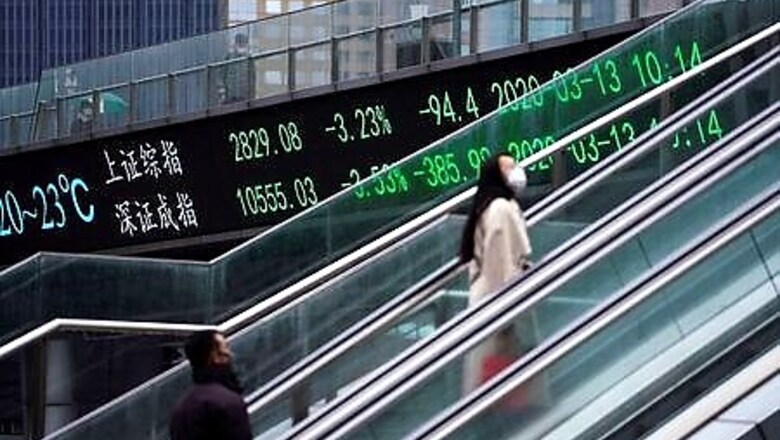
views
BOSTON Asian stocks were set for a cautious start on Tuesday, following a mixed Wall Street session and as investors eyed stalled U.S. stimulus efforts and worsening strains between Washington and Beijing over Hong Kong.
Australian S&P/ASX 200 futures fell 0.05% in early trading.
Japan’s Nikkei 225 futures slipped 0.04%. Tokyo markets were closed for a public holiday on Monday.
Hong Kong’s Hang Seng index futures rose 0.43%.
“The very subdued start to the week in all time zones Monday looks like persisting in Asia today,” Ray Attrill, Head of FX Strategy at National Australia Bank, told Reuters via email.
Attrill noted little progress on the next round of U.S. fiscal stimulus, more tit-for-tat posturing between China and the U.S., and a light calendar for Asian financial markets.
Asked on Monday if he would respond to new Chinese sanctions on 11 U.S. citizens, including Republican lawmakers, President Donald Trump said he had already responded with sanctions on Hong Kong and Chinese officials last week.
However, Trump also added that the Phase 1 trade deal with China means “very little,” which could set the stage for further tension when officials from both countries meet on Saturday to review progress over the first six months of the agreement.
U.S. stocks were mixed on Monday. The Dow jumped 1%, the S&P 500 inched up and the Nasdaq closed lower as investors extended a rotation into value stocks from heavyweight technology-related names.
U.S. congressional leaders and Trump administration officials said on Monday they were ready to resume negotiations on a coronavirus aid deal but talks remained deadlocked as Democrats said Republicans needed to meet them in the middle.
Also on Monday, China imposed sanctions on 11 U.S. citizens including lawmakers from Trump’s Republican Party in response to Washington’s imposition of sanctions on Hong Kong and Chinese officials accused of curtailing political freedoms there.
The dollar gained, but analysts said this move was likely unsustainable.
“U.S.-China tensions continue to simmer, and are providing support to the dollar,” strategists at Commonwealth Bank of Australia wrote in a note on Tuesday. “But we doubt U.S.-China tensions can derail the well-established dollar downtrend.”
The dollar index rose 0.18%, with the euro up 0.03% to $1.174.
The Japanese yen strengthened 0.01% versus the greenback at 105.95 per dollar.
The Australian dollar was flat versus the greenback at $0.715.
The Korean won weakened 0.01% versus the greenback at 1,185.73 per dollar.
Oil rose, supported by the Chinese producer price data, rising energy demand and hopes for an agreement in the United States on more coronavirus-related economic stimulus.
U.S. crude were up 0.12% to $41.99 per barrel and Brent was flat on the day.
(Editing by Sam Holmes)
Disclaimer: This post has been auto-published from an agency feed without any modifications to the text and has not been reviewed by an editor


















Comments
0 comment